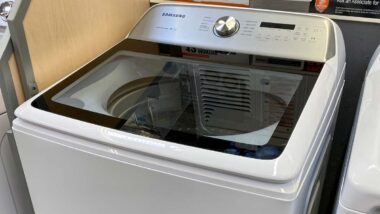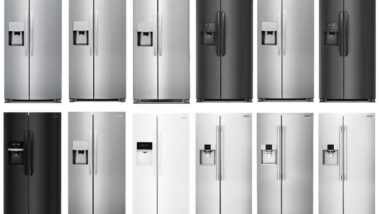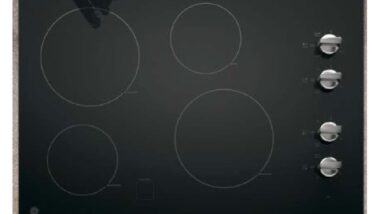Top Class Actions’s website and social media posts use affiliate links. If you make a purchase using such links, we may receive a commission, but it will not result in any additional charges to you. Please review our Affiliate Link Disclosure for more information.
A class action lawsuit claiming a Samsung dryer defect causes the drums in the appliances to crack is intact after a motion to dismiss.
Samsung argued the class action lawsuit should be dismissed because the plaintiffs had not adequately established their claims. U.S. District Court Judge Kevin McNulty tossed most of Samsung’s motion, but trimmed a few state law claims.
According to the class action lawsuit filed in 2018, certain Samsung models suffer from a dryer defect that causes the drum to crack, resulting in loud noises, destroyed clothing and potential fires. The plaintiffs say Samsung uses defective fly wheels and gauge steel that is too thin. The only remedy is a costly replacement of the drum, the complaint alleged.
The Samsung class action lawsuit accused the manufacturer of misrepresenting the quality of the high-end appliances to consumers, as well as of violations of federal warranty law and state consumer protection laws.
Judge McNulty upheld most of the class action lawsuit claims, including for violations of the Magnuson-Moss Warranty Act, noting the plaintiffs “offer factual support for their allegations that they had no meaningful opportunity to participate in creating the warranty or alter its terms in any way; for example, the warranty is included in product packaging ‘on a pre-printed form’ and the ‘[c]onsumers are not involved in the preparation of the warranty.’”
The judge also refused to dismiss claims that Samsung violated the Uniform Commercial Code and most claims for fraudulent omission under Ohio, New Mexico, New Jersey, Florida, California and Illinois law.
Samsung argued fire hazard claims should be dismissed because none of the plaintiffs alleged they had suffered a fire due to the dryer defect. Judge McNulty disagreed, noting that the class action lawsuit pointed out the potential for a fire if lint falls through a crack in the drum caused by the alleged defect.
“It is true that plaintiffs have not alleged any particular instances where the defect caused a fire,” the order stated. “That may suggest a future weakness in their case, but their theory of fire risk is sufficiently plausible to state a claim at this preliminary stage.”
“We are pleased with the court’s well-reasoned decision, as nearly all of the plaintiffs’ claims will move forward,” one of the lawyers representing the plaintiffs told legal news source Law360 in response to the most recent order. “We are eager to continue pursuing the appropriate relief for the plaintiffs and putative class.”
Indeed, the only claims that were trimmed from the class action lawsuit were unjust enrichment claims under Florida, Illinois and Ohio state laws, as well as a misrepresentation claim under Ohio’s Consumer Sales Practices Act.
According to the order dismissing certain claims, the class action lawsuit had failed to allege that the Florida plaintiff had purchased their Samsung dryer directly from the manufacturer, as required for an unjust enrichment claim under the state’s law; however, the judge did leave the door open to amend the complaint to rectify the claim.
“To properly plead an unjust enrichment claim under Florida law, plaintiffs must re-allege their claim with a plaintiff who purchased his or her dryer directly from SEA,” stated the order.
In addition, claims under the Ohio Consumer Sales Practices Act (OCSPA) were dismissed because the plaintiffs failed to allege that Samsung omitted information about the dryer defect.
Additionally, the judge noted that it appeared as if the plaintiffs had abandoned that claim.
“Because the complaint does not adequately plead an omission under the OCSPA, and because plaintiffs have abandoned any misrepresentation claim, no OCSPA claim remains,” the judge concluded.
According to the order, the plaintiffs will have the opportunity to amend their class action lawsuit to address most of the dismissed claims except for dismissed allegations under the Ohio Deceptive Trade Practices Act (ODTPA).
“The ODTPA claims will be dismissed because consumers do not have standing to sue under that statute,” the judge said in his order.
The Samsung class action lawsuit seeks to represent consumers who purchased dryers with the defective drum. The plaintiffs are seeking a variety of damages, along with court costs and attorney fees.
Do you own a dryer affected by these alleged defects? We want to hear from you. Tell us about your experience in the comment section below.
The lead plaintiffs and proposed Class Members are represented by Bruce D. Greenberg and Susana Cruz Hodge of Lite Depalma Greenberg LLC and Sauder Schelkopf LLC.
The Samsung Dryer Defect Class Action Lawsuit is DeFrank, et al. v. Samsung Electronics America Inc., Case No. 2:19-cv-21401-MRB, in the U.S. District Court for the District of New Jersey.
Read About More Class Action Lawsuits & Class Action Settlements:

















313 thoughts onSamsung Dryer Defect Class Action Lawsuit Survives Motion to Dismiss
Cracked Samsung dryer drum – Model no DV45K6200GW/A3, SERIAL NO 0AMM5BBH800852E
PURCHASED in Sept 2016. Noisy and many ripped clothes. No recourse but to replace the drum or the dryer. Considering replacing the dryer completely as the problem seems recurring even if drum replaced (not covered by warranty).
This literally just happened to me last night. I have a Samsung Model DVE41A3000W purchased December 22nd, 2022. Last night I was drying some clothes that were already mostly dry from sitting in the washer overnight. Some time after I started the dryer, I was in my living room and heard what sounded like a brick rolling around in the drum. Ran to the garage, turned it off, opened the door and smelled burning. Luckily nothing was on fire or seems singed. I contacted Samsung customer service this morning and the representative (I sh*t you not), sent me a YouTube video about the normal sounds that dryers make, and asked me to double check that anything with zippers and buttons were turned inside out before drying. He got testy when I told him that I know it’s broken, and it’s not an issue over whether or not I recognize normal dryer sounds. I have never felt so patronized. I saved the conversation, as well as my receipt from Best Buy showing the purchase date (it’s just over 2 months out of warranty – ugh) I also have proof that all of the vents were professionally cleaned just 3 weeks ago.
My dryer made some weird noises which I thought it was just something in the dryer. The next time I turned it on the dryer immediately started smoking and burning smell of burnt wires coming from the control panel. I unplugged the dryer and the smoke continued. I called the fire depot because the gas line is also there. The dryer is only 3 years old!